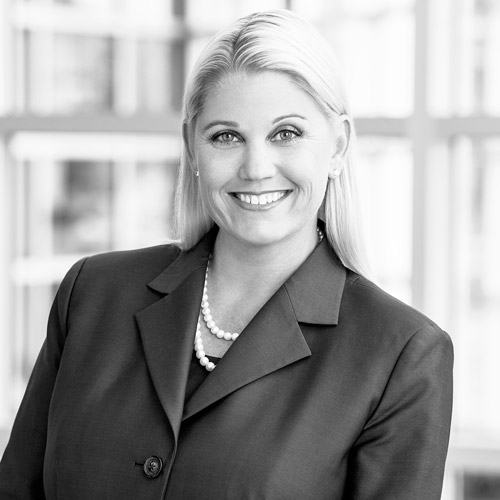The insurance industry changes slowly. In fact, some of the policy language used today is the same as it was a hundred years ago, according to Robert Suglia, senior vice president and general counsel at Amica Mutual Insurance. Yet social, economic, environmental, and technological forces do prompt insurance carriers to alter venerable precepts. Climate change, the sharing economy, and new automobile safety features are all challenging time-tested assumptions today.

Responsible for government affairs and legal matters for the Rhode Island-based auto, home, and life insurance company (through wholly owned subsidiary Amica Life), Suglia must help Amica make sense of these changes and advocate for its interests in statehouses and within regulatory agencies. Early in his career, before entering corporate legal practice, Suglia didn’t realize the significance of a government affairs role. That soon changed, and perhaps it has never been more evident than during the current decade.
Consider how global climate change, widely believed to be fueling more powerful storms, presents certain challenges to the industry. For Amica, with strongholds in the New England states, Florida, Texas, and California, coastal zones make up a large chunk of its insured properties. These areas are vulnerable to storm damage, making them riskier to insure than inland areas. Insurance carriers have recently responded with deductibles on homeowners plans for hurricane damage.
Several years ago, a bill in the Rhode Island legislature meant to restrict insurers from adding such deductibles challenged this strategy. A registered lobbyist in Rhode Island, Suglia and other industry advocates had to make a strong case at the statehouse for amending a bill that had consumer appeal—at least on the surface. Their aim was to preserve a market system that works well to address risks appropriately, Suglia points out. “If you have a law that is overly restrictive, it could cause companies not to write coverage in coastal areas, which would be a bad situation for everyone,” he says.
Exercising the arts of negotiation and compromise, Suglia helped to get legislation passed that allowed insurers to implement deductibles within certain limits. Suglia’s responsibility for government affairs extends to the work of hammering out the regulatory fine print. “Once that bill passed, regulations had to be put in place that carried out that legislation,” he says. The content of notice that insurers would have to give policyholders about new hurricane deductibles had to be approved and enacted by state regulators. “The whole process was an example of legislators, regulators, and the insurance industry working well together to get an outcome that helped preserve the market,” Suglia says.
A heavily regulated industry requires constant engagement with legislative staff and regulators—a reality that is certainly now clear to Suglia after twenty-five years as an insurance industry attorney. Suglia is directly involved with legislative matters in Amica’s home state and sometimes in neighboring states, but much of the company’s advocacy takes place in cooperation with industry trade groups.
Insurance companies may be fierce competitors in the marketplace, but they band together in the government realm to promote shared regulatory interests. Suglia is a leader in shaping the industry’s approach to government affairs advocacy. He served as chair of the Legal and Government Affairs Committee for the Property Casualty Insurance of America Association (PCI) in 2012 and 2013, and he has played a prominent role in several other trade groups.
Industry associations drive insurers’ responses to new issues, so Suglia and his cohorts in PCI have considerable influence. Recently, the rise of the sharing economy has raised new issues for politicians, regulators, and insurers. How should new business models like the ride-sharing companies Uber and Lyft be treated? For insurers like Amica that focus solely on the consumer market, how do you tailor auto policies for Uber or Lyft drivers that split the use of their vehicles between commercial and personal use? The way these challenges are addressed can influence the growth of shared economy businesses.
“The industry has reacted very rapidly to transportation network companies,” Suglia says. Insurers want to make sure that the purely commercial use of the car is excluded from personal coverage, but the line between the two can be blurry. For example, Amica is developing new auto insurance policies that would cover a driver before the Uber or Lyft policy kicks in.
“Our industry doesn’t take a position on how transportation network companies should be regulated,” Suglia says. “We want to make sure that there is coverage in place whether the transportation network companies are providing it or if we’re providing it to ensure that people are appropriately protected and to avoid disputes about who’s providing coverage. We also want to make sure that any legislation doesn’t force us to provide coverage if we decide not to provide it, but also provides us with flexibility to develop new products.”
New technology to make cars safer is going to have a huge impact on the auto insurance industry, according to Suglia. Advancements such as antilock brakes, air bags, and collision warning and avoidance systems that alert drivers to danger and even automatically apply brakes to prevent accidents, are making motoring safer. Eventually, self-driving technology being pioneered by the likes of Google and Tesla could raise safety to unprecedented levels.
“As you get safer and safer cars, there are going to be fewer accidents,” Suglia says. “There’s going to be a decline in liability and collision payments. In the next ten years, we may reach the peak in auto insurance losses that will lead to lower premiums. In the long term, there will be a major shift in the auto insurance industry. With autonomous cars, you might have the auto manufacturer covering the loss in the event of an accident.”
Yet the end of the auto insurance industry isn’t imminent. “I think there will always be a need for personal auto insurance because there will always be individually driven cars—at least for as long as I can foresee,” Suglia says. “Though, in the long term, there is going to be less of a need for that coverage, and the industry is going to have to adjust.”
As conditions keep changing, Suglia will continue to provide leadership in industry association committees to ensure that insurance companies’ interests are well-represented before decision makers. After all, it’s a function as vital to the industry as the nuts and bolts
of underwriting.

